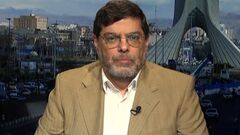Mohammad Marandi
(academic, broadcaster, writer) | |
|---|---|
 | |
| Born | 1966 Richmond, Virginia |
| Alma mater | University of Tehran, Birmingham University |
Seyed Mohammad Marandi is an Iranian American academic and political analyst who is currently a professor of English Literature and Orientalism at the University of Tehran.[1] He was formerly the head of the North American Studies program at the university.
He is the son of Alireza Marandi, a physician who has served in Iran's government as Minister of Health as well as a Member of Parliament.
Contents
Background
Mohammad Marandi was born in Richmond, Virginia and spent the first 13 years of his life in the United States. Following his return to Iran, he volunteered to fight in the Iran-Iraq war and survived two chemical weapons attacks.
Marandi is a graduate of the University of Tehran and Birmingham University (UK), where his PhD thesis was entitled "Lord Byron, his critics and Orientalism", described as a "response to Edward Said's Orientalism".
Career
Mohammad Marandi has appeared as a political and social commentator on international news networks such as PBS, ABC, CGTN, CNN, BBC, Al Jazeera, and RT. He has also contributed opinion pieces to publications such as Al Jazeera, Middle East Eye, and Tehran Times.[2]
He is an adviser to the Iranian nuclear negotiations team in Vienna.
Following the 2022 stabbing of Salman Rushdie, Marandi wrote "I won't be shedding tears for a writer who spouts endless hatred & contempt for Muslims & Islam." Marandi also alluded to a conspiracy theory suggesting that the action reflected an attempt by Iran's enemies to harm its image, writing "is it a coincidence that just when we are on the verge of revitalising the nuclear agreement, America makes claims about an attempted assassination of Bolton and then this happens?" Marandi's statement referenced the United States Department of Justice's allegation that Iran had planned to assassinate US national security advisor John Bolton in 2020.[3]
Publications
- "Oppressors and Oppressed Reconsidered: A Shi‘itologic Perspective on the Islamic Republic of Iran and Hezbollah’s Outlook on International Relations" (with Raffaele Mauriello) in Islam and International Relations: Contributions to Theory and Practice, Springer, 2015, pp. 50–71.
- "The Khamenei Doctrine: Iran’s leader on diplomacy, foreign policy and international relations" (with Raffaele Mauriello) in Islam in International Relations: Politics and Paradigms, Routledge, 2018, pp. 18–38.
References
Wikipedia is not affiliated with Wikispooks. Original page source here